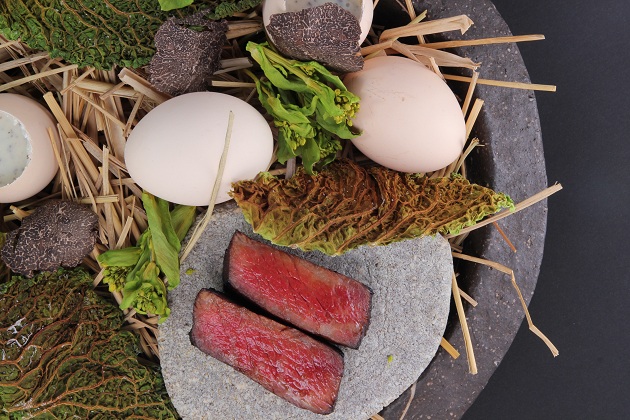
Interview with Chef Zaiyu Hasegawa
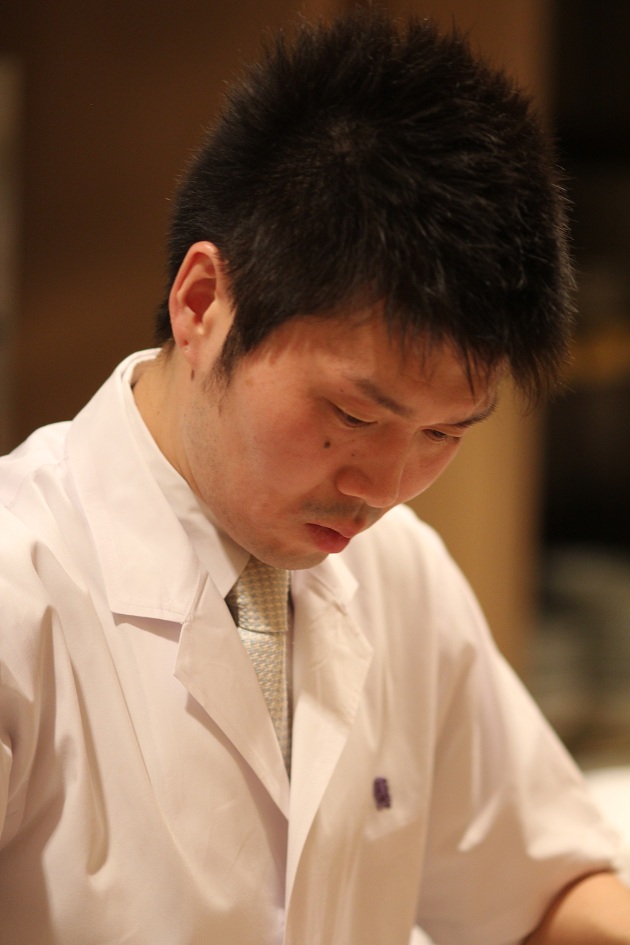
Zaiyu Hasegawa is the owner of Den, a Japanese restaurant in Jimbocho, Tokyo. Garnering much attention in just three years after its opening, Den received two Michelin stars. We asked Zaiyu about his feelings in creating a "new form of Japanese cuisine."
What motivated you to become a chef?
Zaiyu Hasegawa (Hasegawa)Ever since I was young, I loved to eat. My mother is a geisha, and I always used to look forward to the food that she would bring back from the ryōtei (high-end Japanese restaurant) where she worked. I used to eat sushi rolls which cost about five thousand yen. From there, my interest in food grew and I began to think about becoming a chef.
Also, when I was young, I liked making things rather than studying. For my home economics class, however, I always got an A (laughs). When cooking in home economics, you always have to follow precisely what it says in the text book, you know. But because I was taught about all the different kinds of high quality ingredients, I was always thinking how this fish would taste better if I cooked it differently instead of sautéing it, for example. So, I never cooked as I was instructed. It seemed that I always had my own way of expression.
When did you actually begin working at a restaurant?
HasegawaAfter graduating high school at the age of 18, with just a futon in hand, I began living and working at a restaurant. It was a Japanese ryōtei where my mother worked in Kagurazaka. Though I didn't get my job though my mother, I kept our relationship a secret at first to avoid any harsh looks. So, when she came to the restaurant, we didn't exchange any words.
Is it still a normal passage for those with that same aspiration to begin working as a live-in chef after high school?
HasegawaNowadays, most of them go to training schools. In my case, I needed money more than I wanted to learn. I wanted to become independent as soon as possible. If you live in, the pay is low, but you don't have to commute and you also get food. I guess I am more of the practical type. Unlike learning with friends in a cozy training school environment, I was under pressure to acquire the skills, because I would be scolded by my senior chefs if I didn't.
Did you train at the same ryōtei until you opened your own restaurant?
HasegawaI also worked at another restaurant where I was introduced to the job. When I was 29, I opened Den.
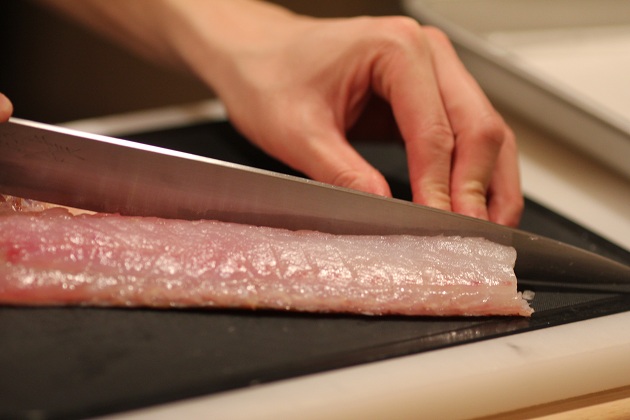
Opening a restaurant at age 29 seems quite early. What made you decide to do so?
HasegawaTo put it simply, the biggest reason was that I wanted to do what I want. There are many chefs, and they all have their own restaurants. In pursuing my career, I began to develop an image of my own style. Working under someone means that even if I had something I wanted to express, I would have to follow the policies and directions of the restaurant or the head chef. So, I wanted to take responsibility and create my own form of Japanese cuisine.
Furthermore, Japanese restaurants tend to be either izakaya (casual Japanese-style pubs) or high end ryōtei. In comparison, French restaurants come in many different styles ranging from high-end grande maisons to causal bistros. I think that people around my age are going from the stage of carousing at izakayas to enjoying drinks and good food with close friends and family members. I wanted to make a place - a restaurant - for such occasions. I wanted to try creating a new form of Japanese cuisine, different from the so-called formal Japanese cuisine.
What do you mean by "a new form"?
HasegawaJapanese cuisine lacks range. If you go to a ryōtei, a course from about 10,000 yen to 50,000 yen is prepared for each customer. Though the customers range from children to the elderly, portion sizes are the same for everyone. And of course, there will be lots of leftovers. Clothes come in different sizes: XS, S, M, L... However, Japanese cuisine comes only in one size. It is like making a child wear free-sized clothing. It's not like haute couture where everything fits each customer perfectly. I didn't want to be like that. Instead, I want to cook something for every customer. I think this relates to omotenashi, the Japanese spirit of hospitality.
From your perspective, what is the Japanese spirit of omotenashi?
HasegawaI think that the spirit of omotenashi is something that only the Japanese have. In the mindset of foreigners, service can be exchanged for a tip. For the Japanese, it is not like that. They have a kind of modesty, in that all they ask for is the happiness of others.
For instance, if someone were to come to me feeling a bit weak with a cold, I wouldn't offer something heavy like curry rice or a beef bowl even if that was what I had already prepared that day. Instead, I would compromise and begin preparing porridge or something more gentle to the stomach. I think that that is what omotenashi is all about and it is what I want to express through my cooking.
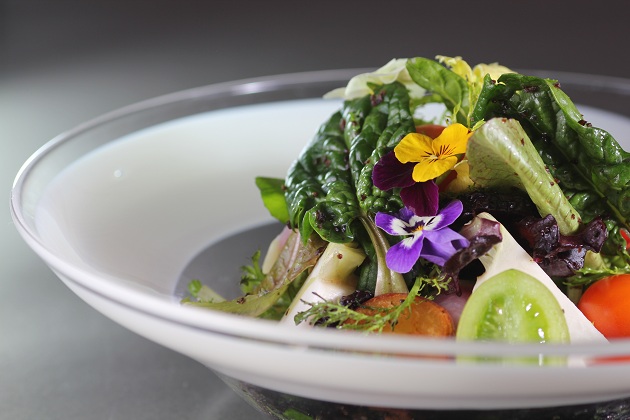
Did you ever think of becoming a chef in a different field?
HasegawaIf I could choose now I might have chosen French cooking. (Laughs) There is no doubt that I love cooking, so as I work, I get interested in all sorts of things. I want to learn more things, like different cooking methods and techniques from other skilled chefs. However, I will always have to have Japanese cuisine as my base.
Do you think that it is the influence of the environment in which you grew up and the experiences you had?
HasegawaYes. Because I am Japanese, I believe that it is important for me to convey the beauty of Japan. I don't want to let Japan continue declining. There may be numerous Japanese restaurants around the world, but few are authentic with Japanese chefs. Even now, many Japanese chefs are opening their restaurants overseas, but I am afraid that if it continues, people would no longer come to Japan to enjoy Japanese cuisine. So, I decided to open a restaurant that would attract people here from abroad. I want to incorporate excellent ingredients, the four seasons, and unique Japanese traditions into my restaurant.
Listening to you, I get a strong impression that you are doing this for the future of Japan. Where does this feeling come from?
HasegawaCompared to Italian and French chefs, there are unexpectedly fewer Japanese chefs out there. The other day, a chef who is a foreigner told me in surprise, "Why do the Japanese teach French cuisine in cooking schools instead of Japanese cuisine?" He also asked me if Japanese people aren't proud of their own food.
Also, children nowadays are used to eating fast food and pre-packaged food. I do understand that kids like these things and it is easier for parents. However, if they begin to think that those kinds of tastes are "umami", I think that it means the loss of the Japanese sense of taste. As a matter of fact, people who are a generation younger than I am are beginning to lose their taste for miso soup. I have to tell these people how wonderful Japan is.
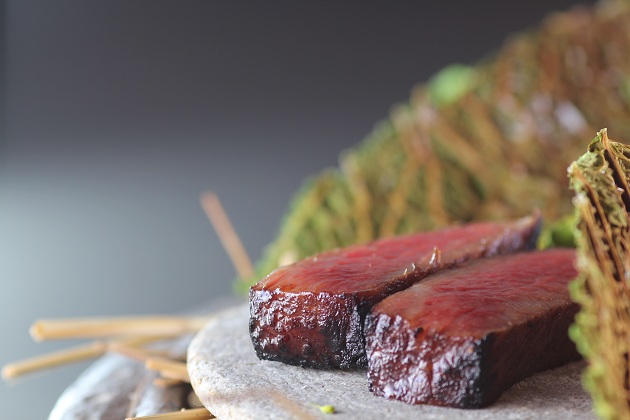
How do you think you can transmit that message?
HasegawaOf course, it is not an easy thing to do. It wouldn't get through if I abruptly began trying to teach parents and children. I feel that I need to make a greater effort for my words to carry weight. I also think that there needs to be a sort of environment that would allow them to realize for themselves. Precisely because of this, I want to pass down to those who come to my restaurant that what they are eating right now makes who they will be tomorrow.
For women, it's better to ingest what is good for their skin, rather than applying cosmetics. For busy middle aged workers, the mindset that it is okay for them to eat cheap packaged food so that they will have enough money to spend on fun needs to be changed. And for a healthy family, parents need to be encouraged to prepare sandwiches for their children instead of feeding them fast food, for instance. If not, the taste of home cooking for those kids is going to be fast food. No matter how hard I try, if younger people don't start changing the way they think about food, I don't think I will be able to make much of a difference.
Were there any hardships in running your own restaurant?
HasegawaThere is nobody to correct me. My customers are the ones who teach me things. Its something like isolation. Being employed, all I had to do is what I was told, and I would be paid. I might be exaggerating, but it is easier to be employed. Sometimes I wonder why I opened my own restaurant. (Laughs) I used to think sometimes about how free the owner was. Now I know better. I have to think about my restaurant and the staff all day, every day.
Of course, I work together with my staff as a team and they support me. But when something critical happens, I have to take risks and make the decisions. It is also my responsibility to protect not just the restaurant itself but also my staff.
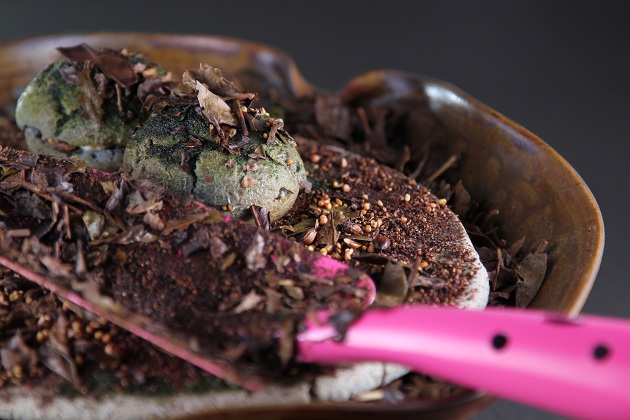
I can feel your strong sense of responsibility as the owner.
HasegawaIn today's society, it is difficult to start something new whether it is a company or a small business. It's quite difficult to put my thoughts into words, but what I thought while working under another person was that it is completely normal to do the work I am paid to do. To work in return for money means that you have to make up for the amount of investment made. To do that, you have to work for more than what you are being paid for, in order to give back. Only then will there be a balance between the employer being supported by the staff and vice versa. That is why I think it is important that people learn many things in their 20s and 30s, and give back to society. If not, self-development will end and people will simply be immature.
It really is a message that I would like for all young people to hear.
HasegawaAll of my staff at the restaurant work very hard, and some come with the will to do so. However, I feel that nowadays many young people seek stability more than anything. I don't think it is wrong to want a stable income and life support and such. But I think people don't grow if they don't desire more. It can be anything, like wanting to open a popular restaurant. I have the desire to continue creating new things.
I have the impression that Japanese cuisine is seen to be traditional and beautiful by following the original ways that has been passed down. Japanese cuisine continues to express the seasons with cherry blossoms for spring, thick green for summer, fallen leaves for autumn, and snow for winter. However, I feel that there could be other ways to express spring in more innovative ways while still keeping some familiarity. That is the kind of feeling I'd like to shape through the food I make.
Zaiyu Hasegawa Profile
Born on June 2, 1978. Hometown, Tokyo. Received training at Uotoku Kagurazaka from age 18. Acquired experience in various restaurants before working as a chef in a restaurant run by his mother for one year. Became independent in 2007 at age 29 and opened Jimbocho Den in Jimbocho, Tokyo. It received a star in the 2011 Michelin Guide after only three years.
